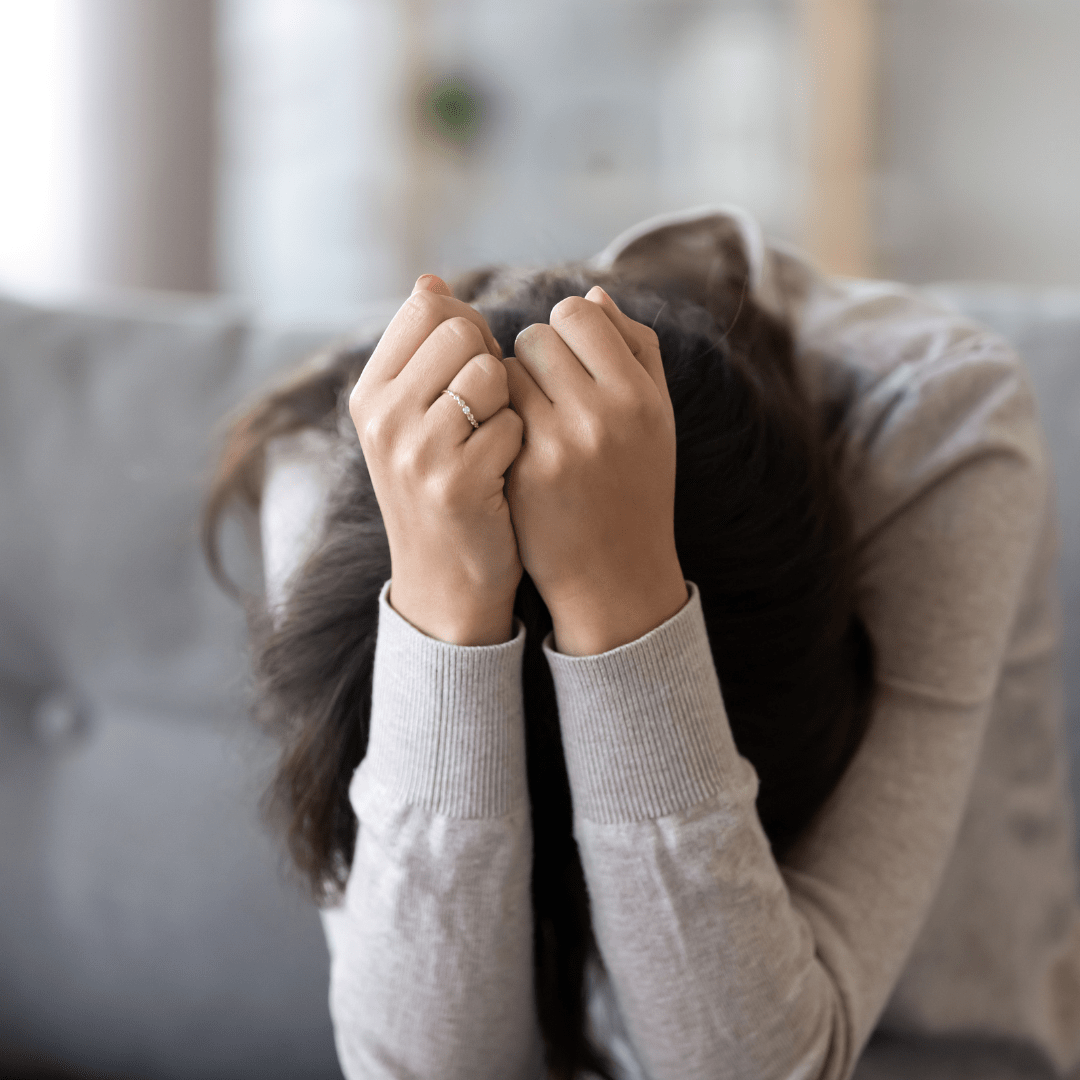It’s very normal and adaptive to feel anxious about things as a human being. If a lion is chasing us, we should feel that adrenaline going and have a response. But if you’re feeling that way every day and it’s regularly stopping you from doing things like talking to your boss, or calling Amazon to make a return, or going to a party, then anxiety might be a problem for you.
Since the pandemic, mental health has been at the forefront for many. It was something so many of us struggled with during the pandemic and over recent years, we have seen a much bigger effort in de-stigmatizing mental health and getting people to talk about it more. Despite this, there still remains a lot of mystery around it, particularly in terms of the most common mental health presentations, including anxiety and depression.
But what is the difference between the type of anxiety and depression that needs treatment and the type that is really just part of being a human being and living a human life?
Today I am exploring how depression and anxiety manifest and operate, when they become emergency issues, and we’ll look at different kinds of medication available, as well as modalities outside of medication that can help mitigate depression. To help me explore the intricacies of anxiety and depression, unravel their true nature, and know when they demand our attention, I am sharing the wisdom from my cherished friend and psychiatrist, Dr. Rosanne Mills.
Before we proceed, a vital clarification: While Dr. Rosanne and I both hold medical expertise, the insights shared here are for educational purposes, not personalized medical guidance. Should any described symptoms resonate with you, please seek advice from a healthcare provider, visit an emergency department, or call your local Healthline.
What is depression and anxiety?
In medical jargon, and especially in psychiatric jargon, we usually use something called the DSM or the Diagnostic Statistical Manual to define what we mean by depression – that someone has a sustained low mood for at least several weeks in a row, if not much longer, and they have a whole host of other symptoms that go with it.
While one person’s depression and another person’s depression don’t always look alike, some common symptoms we look at would be energy, sleep, feelings of guilt, feeling low, differences with appetite and concentration, and suicidality or thoughts about death. There are certainly lots of other symptoms that can go with depression, but those are the ones that we look at when we’re defining a depressive episode.
This is something that lasts for at least a few weeks in a row without significant periods of feeling normal or not depressed, and is also causing dysfunction in your life in some way. We all have days where we have low mood, or low energy, or aren’t sleeping well, but it’s the persistence of symptoms and the disruption it has to your life overall that distinguishes between having a bad day and having a major depressive episode.
There are many different anxiety disorders, which makes it a little bit more complicated to give an exact definition, but similarly, the main thing is that it is causing dysfunction in your life on an ongoing basis.
At what point should you seek help?
- If you’ve been struggling on an ongoing basis for a long time with more mild symptoms that are getting in the way of your life
- If you’re having any thoughts that you’d rather be dead or any thoughts about suicide on a regular basis, especially if they’re becoming more significant than usual. In the extreme case you are considering suicide in a serious way, I would always encourage you to dial 911 or go to your nearest emergency department because that is a true emergency.
- If you are becoming paranoid or having beliefs that there is some conspiracy about you, or hearing voices, these could be symptoms of psychosis, which is another reason to seek help immediately. This is also something to look out for in people around you if what they’re saying doesn’t quite fit with the reality.
- If you are pregnant or have just had a baby, you are particularly vulnerable to having a mental health crisis. Things can spin out of control quite quickly during this time, so it is especially important to speak to a healthcare practitioner earlier rather than later.
What treatments might be offered for depression and anxiety?
The options that are available to you may depend on where you are geographically. But in general, the two first line interventions for anxiety and major depressive disorder are medications and psychotherapies. There are other interventions such as exercise, which can be very helpful for both of these conditions.
For mild and moderate depression and anxiety, medications and psychotherapy are both first line, but when we get to the more severe depression, we may be asking patients to have medication more as a first line and then introduce psychotherapy a little later on when they’re feeling better. For severe types of depression, you often don’t have the concentration, memory, motivation or ability to engage in other kinds of interventions that could be helpful.
What are the side effects of the medications?
The first line medications are for most people the SSRIs or SNRIs (selective serotonin reuptake inhibitors and selective norepinephrine reuptake inhibitors). These may not be appropriate for everyone, especially if you do have something like bipolar disorder or certain medical indications.
The common side effects tend to happen when people are starting and stopping the medications, and most commonly this is gastrointestinal upset. You may experience things like nausea, diarrhea, and sometimes constipation. Headaches are another common side effect. Most of the time after people stay on a dose for a couple of days, those side effects go away but for the odd person, they don’t.
People can also experience appetite and sleep changes and one of the most common side effects that doesn’t go away after a few days is sexual dysfunction. That can look like low libido, and difficulty with orgasm or ejaculation.
The side effects that can happen when starting the medication can also occur when you’re stopping it. Therefore, if you’re unhappy with a medication because it’s not working or because you’re having side effects that are bad, you should always chat with your doctor before discontinuing them. For most people, we prescribe a slow wean off the medications so your body can get used to not being on it anymore. This also enables you to have a plan if your symptoms reappear.
There is a level of patience required with these medications as for both depression and anxiety, the way you feel on the inside is one of the last things to change. It can take up to six weeks, or even two months for older adults to have an effect. The first things you’re going to notice are side effects, which usually go away with time.
For how long do I need to stay on medication?
If the medication has worked and you’re thinking about coming off, I would recommend waiting at least six months to a year after your symptoms have been totally under control or at least adequately under control for you. Then I would recommend a slow weaning off as mentioned before. I’d also recommend picking a time when you don’t anticipate having really high stress, like starting a new job or having a baby.
There are circumstances where I would recommend staying on an antidepressant lifelong, especially in major depressive disorder where people have repeated episodes of depression. The other circumstances I would recommend staying on the medication is if you’ve had a really severe depression, where you’ve been suicidal or you’ve been hospitalized, and definitely if you’ve ever had any psychotic symptoms.
What causes anxiety and depression?
There are definite genetics involved in depression and anxiety and there have been lots of twin studies which clearly show that people who share some genetic material are at higher risk of having depression and anxiety, even if they are raised in different environments .
Early life experiences are another big risk factor for both depression and anxiety. Having early childhood abuse, or adversity such as poverty in your family, or exposure to uncertainty in your environment, can all contribute to anxiety and depression both as a child and as an adult as well.
Socioeconomic stressors in your adult life can also contribute, such as losing a job for example. Using alcohol and other types of substances as an adult also significantly raises your risk of depressive symptoms.
How to advocate for yourself when discussion mental health with your family physician
- Try to bring it up at the beginning of the appointment. Depression and anxiety can both cause a lot of shame. Bringing it up early in the conversation means that your family physician has time to address your questions and concerns properly.
- If you don’t have a really trusting relationship with your family doctor, try and see if there’s anyone else in the clinic or anyone else who you can talk to. You could even call a local mental health organization to talk about support. Is there a risk for depression, anxiety and other things during that menopause transition as well?
There can be a great sense of relief just sharing that you’re experiencing symptoms of anxiety and depression because inevitably when you share that, you’re more likely to find out that other people also have that experience too and you will feel less alone. Talking about your own mental health can be a really helpful tool in itself, and most healthcare practitioners are going to be supportive too.
Psychotherapy for most people can be really helpful and for the right person, the right antidepressant can also be a very good option. Most people with anxiety and depression do feel better when they get appropriate treatment. So if you are feeling a sense of shame or hopelessness with all of this, know that there can be a light at the end of the tunnel and that there are things to help you through this – reaching out is a vital first step.




